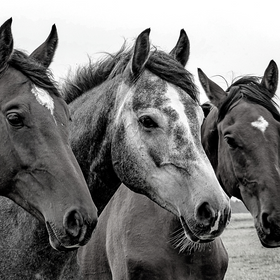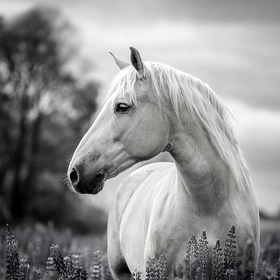
A Healthy Diet Based on the Season
Just like people, horses benefit from seasonal changes in their diet. Adjusting your horse’s diet each season can increase energy, support healthy weight, and boost immunity. We’ll look at ways to tailor a horse's diet across the four seasons for optimal health.
Fall: Preparing for Winter
As temperatures start to drop and the grass becomes less nutrient-dense, fall is a time to prepare your horse’s body for the winter months ahead. Getting your horse in good shape before winter makes it easier to keep them healthy during the cold months.
Fall Feeding Tips
- Increase Forage Gradually: Add more hay to your horse’s diet as pasture quality declines to replace lost nutrients.
- Add Digestive Support: Use prebiotics or probiotics to support gut health as the diet shifts to more hay.
- Monitor Weight: Check your horse’s weight in the fall. If underweight, increase high-quality hay to prepare for winter.
Winter: Keeping Warm
Throughout the winter, horses naturally spend more energy to keep warm. Forage, such as hay, becomes a crucial part of their diet. Hay provides essential nutrients and generates heat.
Winter Feeding Tips
- Increase Forage: Try to provide at least 1.5–2% of the horse's body weight in hay daily. The more forage a horse eats, the more heat is produced to help keep them warm.
- Monitor Weight: Horses tend to lose weight in winter, so consider adding a higher-calorie feed like beet pulp or grain if needed.
- Supplement with Oil: Adding fats, such as flaxseed oil, can give horses an additional energy boost without excessive starch.
Spring: Transition to Fresh Grass
When spring arrives, lush green pastures offer horses fresh grass, which is rich in vitamins and nutrients. While this is a treat for your horse, it's also important to monitor their intake to prevent stomach issues and conditions like laminitis.
Spring Feeding Tips
- Gradual Grazing: Start with short grazing periods, and gradually increase the time your horse spends on fresh grass to allow them time to adjust.
- Watch for Laminitis: Horses prone to metabolic issues or laminitis should have limited access to high-sugar spring grass. Grazing muzzles are a great solution to try.
- Balance with Hay: Even with access to fresh grass, it’s essential to continue providing hay, especially if pasture quality varies.
Summer: Focus on Hydration
Hot summer days can cause horses to sweat more, leading to dehydration and the loss of essential electrolytes. Adjusting a horse's diet to meet their hydration needs is crucial, especially if they’re working hard in the heat.
Summer Feeding Tips
- Increase Water Intake: Ensure fresh, clean water is always available. Try offering water in shaded areas to keep it cool.
- Supplement with Electrolytes: For horses that sweat a lot, add electrolytes to replenish lost sodium and potassium.
- Forage Considerations: Summer pastures may dry out, offering less nutritional value. Supplementing with good-quality hay ensures your horse continues to receive essential nutrients.
General Nutritional Considerations
Regardless of the season, your horse’s diet should always be balanced. Here are a few tips that apply year-round:
- Maintain Consistency: Horses thrive on routine. Make dietary changes gradually to avoid any stomach issues
- Monitor Body Condition: Regularly assess your horse’s weight and adjust their diet accordingly.
- Consult an Expert: If unsure about your horse’s diet, consult a vet or nutritionist to ensure proper nutrition.





